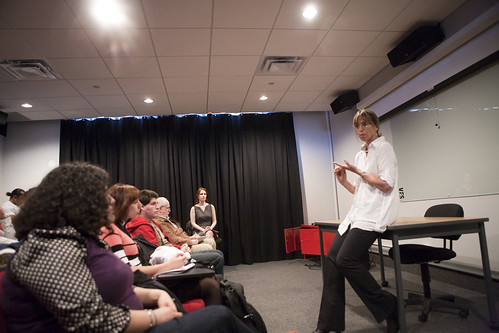Happy new year! Got 2013 planned out? Know exactly what you want to accomplish this coming year and what you need to succeed? If you?ve still got some room in your 2013 plan, here are a couple of tips to consider. Plus, you?ll find a list of great goals for actors, writers, directors, and producers.

New year fireworks for 2006 in Sydney, Australia. Photo courtesy of Rob Chandler.
Accountability club
Are last year?s goals still on this year?s list? If you?re having trouble setting goals and meeting them, an accountability club may be an excellent solution.?An accountability club is a small group of people who support each other on their goals. They may meet in person every week to three months. Plus, they may provide support via email and social media between meetings.
After one of my friends who is an upper level TV exec lost her job, she formed an accountability club with a few of her job-seeking friends. They met every week and pooled their resources. It boosted not only her spirit but also her chances of landing a job. Each person would set his or her own weekly goals. For example, she might say she intended to contact five industry contacts about possible job opportunities. When the next week rolled around, the group wanted to know if she had followed through and what the result was of touching base with her industry contacts. Holding each other accountable for their personal goals helped keep them on track and motivated to find their next perfect job. I?m happy to report that my friend has since secured a great gig at a cable network.

Friends discuss their lives over a meal. Photo courtesy of Vanessa Pike-Russell.
It?s important to note that an accountability?group?s core function is to provide support, so it?s best if the group doesn?t judge its members. I suggest keeping your accountability club and writers? groups separate. Having friends or colleagues who are more cheerleaders than critics or taskmasters makes the group much more productive and less emotionally charged. This is incredibly important. When you?re setting goals, you?re letting others privy to your hopes and dreams. You don?t need critical voices telling you to be more realistic.?I think it?s great to dream big and adjust accordingly. Your club members should have no personal stake in your success. They should adjust their expectations as you tweak your goals and help you course correct your plan without laying on a guilt trip or causing you self-doubt. The right combination of personalities can make an accountability club a powerhouse.
What?s more, you can include anyone you want. For example, you could have a writer, director, musician, and non-profit fundraiser. Every member doesn?t have to have the same goals. Again, an accountability club is all about supporting your dreams as well as your those of your friends.

Dreams and wishes are captured in jars. Photo courtesy of Nicole Pierce Photography.
Dream big and set manageable goals
As I mentioned, I believe in dreaming big. I also believe in making small, concrete goals to help achieve your dreams. For example, your dream may be to write a novel; however, it doesn?t really help to have ?write a novel? on your to-do list. You need to break it down into more manageable, bite-size goals so you actually can make headway on your project.
These smaller goals might be yearly, monthly, weekly, and/or daily goals. Make these very tangible. Some people decide they?re going to write, say, five pages a day until they finish a draft of a script. Novelists might set daily or weekly word count goals. Choose small, attainable goals that work for you, even if it?s just a page a day.
So what small, concrete goals might help you attain your big dreams? Actors, writers, directors, and producers ? here?s a list of tangible goals you might want to add to your 2013 plan.
Actors

Actors in medieval costumes walk to the set. Photo courtesy of upyernoz.
Volunteer for a staged reading. Staged readings are one-night performances set up to help workshop a script or play. Generally, actors will be assigned one or two roles to read from the work. The actors are usually seated in a semi-circle on a stage and read the work from beginning to end. This reading may take place in front of an audience. At the last staged reading I attended, there were several talent agents in audience as well as the amazing actor Diane Venora (?Heat,? ?The Insider?) so you never know who might see you perform.
Learn a new monologue. It?s always good to have fresh material ready. Plus, you need to constantly work on your performance and memorization skills. Breaking down something new can help you practice for your next audition.

A girl rides her horse on Morro Strand State Beach. Photo courtesy of Mike Baird.
Learn a new skill. There?s the old Hollywood joke about the actor who is asked at the audition if he can ride a horse. He bluffs and says of course he can ride a horse. He gets the part. Problem is he doesn?t know how to ride a horse and has to learn ? by the next day. Instead of getting in this classic bind, learn how to ride a horse. Or take a firearms safety class at the gun range. Or take fencing lessons and learn how to handle different edged weapons now. This way you?ll be ready to step into your next role be it a cowhand, an FBI agent, or a pirate. It?ll help make it seem like the part was made for you.
Do improv. As an actor, being spontaneous can win over producers, directors, and casting directors. And being spontaneous appropriately can be learned. Yes, there?s a right way to riff and less successful ways to riff. Through improv, you can learn positive ways to keep a scene going. Hint: It has a lot to do with not shutting other people down. Oddly enough, you get better at being spontaneous the more you practice.

All the world?s a stage, but here?s a nice one. Photo courtesy of Alan Cleaver.
Go to a play.?Plays are the high-wire act of performing. There are no cuts, no editing, no fixing it in post. Truly, it can be one of the most thrilling, engaging ways to experience art. So don?t just watch movies and television. Keep in touch with your craft by at least watching plays if not auditioning for a production.
Watch a director shoot a scene. Most actors experience directors while they themselves are being directed. They don?t observe directors working with other actors unless they?re also in the scene. Removing your vested interest in the scene can give you a perspective on the craft of directing. Watch how the director responds to the scene while it?s being played. Like a poker player, watch for any tells the director has for her likes or dislikes with a performance. Write down any questions you have and hold them for a camera move or the end of the day. If there is time, ask the director your most pressing questions while also trying not to interfere with the director?s work. You?ll find this fly-on-the-wall observation time will help you collaborate with your next director.
Talk to directors about their approach to directing actors. If you can?t observe on a set, take a director out for coffee. Do an informational with her. This is a wonderful way to not only figure out the best way to work with different directors, but also to meet a few directors who may remember you when casting their next project. However, stay focused on learning their approach to directing. Nothing is worse than someone asking you to coffee for one reason while having ulterior motives.
Talk to casting directors and assistants about mistakes actors make when auditioning. The best way not to make mistakes is knowing exactly what to avoid.
Writers

A writer takes advantage of a quiet moment. Photo courtesy of Robert Goodwin.
Write. Always be working on something new, even if you already have a gig.?Finish your current project.?Polish your last project.?Break a new project. Be a writing machine. Again, divide your writing into smaller, bite-size goals. For example, break the first act of your new project this week, polish the first 15 pages of your script today, write five pages every day until you finish your first draft, etc.
Do improv. Like actors, writers can benefit from improv. It?ll help you be more engaging in a room. You?ll be open to new ideas. It can help you brainstorm ideas for your own work. And you?ll understand the difficulties actors face when performing. All writers should take improv or acting classes.
Research areas that interest you.?I don?t start breaking a project until after I?ve researched it.?I love to delve into an arena with no expectations of where the project will go. Usually I find the characters, story, structure ? the whole project blooms after I?ve immersed myself in the subject matter. Perhaps, you?ll find the same.

Screenplays are displayed by a street vendor. Photo courtesy of Scott Beale.
Read scripts by your favorite writer. And try to find an early draft or production drafts of the scripts. The published scripts you can purchase from Amazon are based on the final edit of the film. They?re polished after the film is finished. It?s difficult to see the evolution of the project based on a final edit draft. Where do you get early drafts and production drafts? See next item!
Read a different script every week. There are plenty of online script sources like Drew?s script-o-rama and Simply Scripts. If you are in Los Angeles, you can go to the Writers Guild Foundation and read scripts in their extensive library. You?ll also find scripts at the Academy of Motion Picture Arts and Sciences? Margaret Herrick Library, which has scripts dating as far back as 1910.
See a play. Plays live and die by the playwright?s words. It?s one of the few mediums that remain faithful to every word in the script. Especially with stripped down production design, the actors only have the playwright?s words to wrap around them. There are no cuts or edits to save a scene.?There is a nakedness, intimacy, and immediacy about plays that make them thrilling and engaging. As a writer, you can quickly see the difference between great writing and less-than-stellar writing performed live in front of you.
Be inspired by great work. Certain films, television shows, plays, operas, and artists inspire us. Immerse yourself in those works that speak to you. Your inspirations will rejuvenate you.
Meet 20 new people who aren?t writers. Yep, who aren?t writers. You ever see writers at networking events? They tend to be clumped together ? usually in a corner. It may be more comfortable to meet other writers, but writers need to meet all kinds of people ? in the business and outside of the business. Link up with people who don?t do what you do. Expand your social connections. If nothing else, meet directors and producers because they need writers to do what they want to do. In other words, put yourself out there, even if it feels a little scary.
Directors

DP Leah Striker (left) talks with director Barbara Stepansky. Photo courtesy of Barbara Stepansky.
Research your next project. If an area interests you, research it. There may be a great project in that arena. And if nothing else, you?ll be stimulating your mind in new directions.
Read five novels, graphic novels, or other intellectual properties with an eye toward how you would direct them. These might not be properties you can acquire, but this exercise will help you form your take on things.
Watch other directors? reels. (Also see below.) Compare your reel to other working directors? reels. How do they demonstrate their mastery of skills? How do they convey their unique style and vision? How does your reel fare against their reels? Be honest. What do you need to do to make your reel stand out? And do it.
Shoot a scene in your home or backyard over a weekend. Even if you?re just shooting on a prosumer camera, you still need to communicate with actors, get all of your shots, and make sure you?ve prepped appropriately so you aren?t stuck on the day without something essential like a prop. And edit the scene together. You?ll likely see places to improve. Plus, you?ll maintain your directing skills while pushing your next project forward. Hint: this could be a scene from your next project.
Start a list of cinematographers, production designers, music composers, editors, any key creatives you?d love to work with. Observing the work of others and having a dream team can help you plan your next shoot. Even if you don?t get to work with Roger Deakins, you may be able to bring in some of his work to communicate your vision with producers, investors, and your own DP.

Line producer Barbara Stoll speaks to students. Photo courtesy of Vancouver Film School.
Sit down with a line producer and learn about budgets. The best way to know if a producer is bullsh*tting you is if you know what a budget should look like. Good producers know what things cost and how much money you need to make a project. Bad producers make up budgets out of thin air and have no facts to back up their numbers. So take a line producer out to lunch and go over a budget. Have him explain what things cost, where they went over budget on a project, why they went over budget on a project, and how they could have prevented going over budget. If you master budgets, you?ll be head and shoulders over other young directors.
Volunteer to help friends on their shoot. A lot of filmmaking is favor-based. You do a favor for your friend, he?ll return with a favor on your project. You really can?t get through a production without some favors being traded, even on big productions. So start now and help friends. You?ll store up a lot of favors and goodwill. In the future, you never know what tight bind you?ll be in and what favor you might need, so stock up now.
Producers

Writer-producer-director Jac Shaeffer (left) and producer Rikki Jarrett hang out on the set of ?TiMER.? Photo courtesy of Rikki Jarrett.
Start a list of artists you want to work with. This list can include dream cast and crew ? above and below the line ? as well as new talent you discover. You need to be able to call upon your list at a moment?s notice because you never know when opportunity may strike.
Meet more artists. It?s imperative that producers meet more artists no matter where they are in their careers. Find ways to connect with artists through social networking and by going to see their shows. Where can you meet new artists? See next items.
Go to comedy clubs. A great way to assess new comedic talent is going to comedy clubs. Stand-up comics live or die by their audience. You?ll know who?s crushing it very quickly.
See the live arts. The performing arts exposes you to actors, writers, dancers, singers, all kinds of performers. It?s one of the best ways to discover new talent.
Read scripts and watch director?s reels.?Whenever you meet a new writer or director, offer to read her script or watch his reel. Find writers and directors who speak to your tastes. You may find people and projects to champion or you may just find artists to follow.
Talk to other producers about the market. Find out how your friends? projects have been received by the town and what?s selling. By understanding the market, you?ll be able to project what might sell in the future or decide this isn?t the right time to take out a particular project. By no means should you chase the market! You should always back projects you love. But you may decide to wait to take out a teen comedy you love because a teen comedy just bombed at the box office and the town is tainted by that loss ? at least temporarily. You want to know the ebb and flow of the industry so your projects have the best chance of taking off.
Learn about budgets! Learn what things cost and how to break down a script. Talk with line producers who know what they are doing. Take them out to lunch and ask them to go over a budget with you. This is the most important skill you will learn as a producer. If you don?t know about budgets, you aren?t really a producer.

Writer-director Elia Petridis reads Variety with an ad for his film ?The Man who Shook the Hand of Vincente Fernandez.? Photo courtesy of Elia Petridis.
Read the trades every day.?The trades include Variety, The Hollywood Reporter, and Deadline Hollywood. Knowing what?s going on in the town is your job. Talking to friends, reading the trades, and generally getting information will make you a more valuable producer.
Happy new year! Now go get ?em.
These lists and suggestions should give you a good start to your 2013 career planning. I hope the new year brings you much happiness and creative satisfaction. I also hope you?ll check back in with ?Glass half-full in Hollywood? and let me know how your year is going. Cheers!
Source: http://kammiller.com/2013/01/01/great-goals-for-actors-writers-directors-and-producers/
john lennon Army Navy Game leann rimes pearl harbor Jacintha Saldanha Grammy nominations 2013 Butch Jones
No comments:
Post a Comment
Note: Only a member of this blog may post a comment.